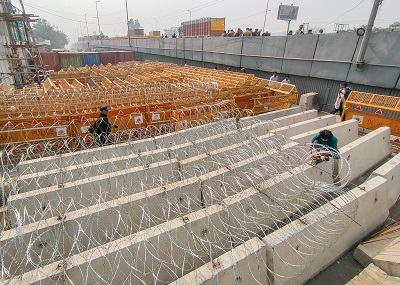
New Delhi, (Asian independent) In view of the ‘Chalo Dilli’ call given by farmers’ associations to stage a protest in the national capital on Tuesday, Delhi Police have invoked Section 144 (prohibitory orders) for a period of 30 days till March 12.
As the harvest season winds down, farmers in Punjab, Haryana and Uttar Pradesh are gearing up for what they are calling ‘Farmers’ Protest 2.0’, reminiscent of the historic demonstrations in 2020-21 against the three now repealed firm laws.
Amid welding sheds over tractor trolleys and stockpiling essentials like waterproof sheets, mattresses, and dry ration, preparations are underway for a march to the Parliament on Tuesday.
With the echoes of the previous protest, which paralysed the major approach roads to Delhi, still resonating, the focus has now shifted to the pressing demands, particularly a statutory guarantee for minimum support price (MSP) for all crops.
The timing of this protest is noteworthy, coinciding with the run-up to the 2024 Lok Sabha elections, where the ruling BJP-led NDA government is seeking a third consecutive term.
With the Narendra Modi-led government’s last Parliament sessions having been concluded, there is no room for any legislative action.
Adding a layer of complexity to the situation comes the announcement of conferring the Bharat Ratna upon Chaudhary Charan Singh and M.S. Swaminathan – two stalwarts revered by the farming community.
Former Prime Minister late Charan Singh was known for championing the farmers’ cause, while late agronomist Swaminathan is considered as the father of the Green Revolution.
Questions are being raised whether the protests are politically-motivated or the grievances are genuine.
Despite these uncertainties, the Central government has deputed three ministers to engage in a dialogue with the farmer leaders.
Meanwhile, as farmers from Punjab and Haryana gear up to reach Delhi on Tuesday, the farmers from Uttar Pradesh, especially the Rakesh Tikait faction, are reportedly not joining the protest call.
To stop the farmers from entering the national capital, the police along with the paramilitary forces have been deployed as security measures on Delhi borders, including at Tikri, Singhu and Ghazipur, with cement blocks and pickets with nails installed on the approach roads.
Large containers to block the roads if needed have also been kept on the borders to stop the farmers from entering the city.
As per officials, over 5,000 security personnel, including paramilitary forces, are on their toes to maintain law and order on the Delhi borders.








